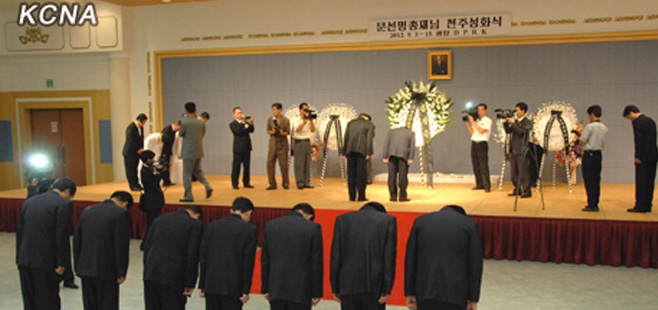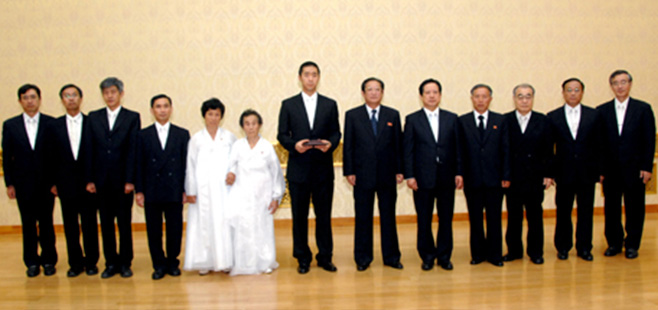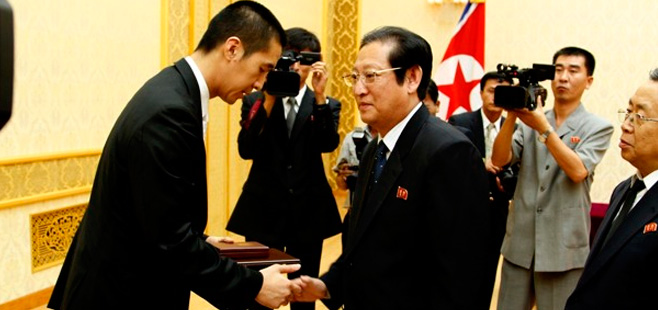The Presidium of the Supreme People's Assembly of the DPRK has conferred the National Reunification Prize upon late Rev. Sun Myung Moon, according to North Korea’s Central News Service (KCNA). Rev. Hyung Jin Moon, the successor to his father’s position as head of a global church, met Sept. 7, 2012 with high North Korean Officials and Rev. Moon’s elderly relatives at the church’s complex in Pyonyang.
“Moon positively contributed to realizing the nation's reconciliation and unity and the country's peaceful reunification and achieving the prosperity common to the nation, true to President Kim Il Sung and leader Kim Jong Il 's idea of the great national unity and line of national reunification,” according to a KCNA report. On the same day, the supreme leader of North Korea, Kim Jon Un sent a floral wreath to the funeral bier of Rev. Moon at the same location. Rev. Hyung Jin Moon was greeted at the Peace Center by Kim Jon Un’s uncle, Jang Song Taek.
See KCNA TV coverage here.
“Perhaps Kim Jong Un did not greet Hyung Jin Nim in person because he views himself as a head of state, and his counterpart is not. Therefore, he sends his uncle, Jang Song Taek,” commented Dr. Mark Barry, an adjunct professor at the Unification Theological Seminary and a subject expert on North Korea.


The KCNA press release included the following explanation:
“Jang Song Thaek courteously conveyed to him [Rev. Hyung Jin Moon] the deep condolences expressed by Marshal Kim Jong Un over the passing of Moon.
“Moon Hyung Jin was deeply moved by the fact that Kim Jong Un sent a message of condolences, a wreath and words of consolation over the passing of Moon Sun Myung. He extended his warmest thanks to Kim Jong Un.
“Present on the occasion was a person concerned of the funeral committee from south side. A ceremony for awarding the National Reunification Prize to Moon Sun Myung was held at the Mansudae Assembly Hall that day.
“Present there were Thae Hyong Chol, secretary general of the Presidium of the Supreme People's Assembly, concerned officials, and members of the bereaved families of the deceased.
“After a decree of the Presidium of the SPA of the DPRK was read out, the prize awarding to Moon Sun Myung who positively contributed to the patriotic cause for the peaceful reunification of the country and the prosperity common to the nation was conveyed to Moon Hyung Jin.”
Kim on Sept. 5, 2012 issued a public message of condolence over Moon's death but stopped short of sending mourners to the South.
This was despite the fact that Moon had sent Unification Church delegations - including some of his family members - to the funerals of both Kim Il-Sung in 1994 and Kim Jong-Il last year.

Rev. Hyung Jin Moon was accompanied by Park Sang-Kwon, president of an auto-making joint venture the church established in North Korea in 1999.
Dr. Barry commented in the following letter sent to Unificationnews.com:
“North Korea decided it could not send a delegation to the South for Rev. Moon’s Seonghwa because, frankly, North-South relations have been bad since the day President Lee Myung-bak took office in 2008, and the DPRK is reluctant to have anything to do with the South as long as he’s in power.
“The sole exception was that the North was allowed to send a delegation for President Kim Dae Jung’s funeral in 2009, but that was because former South Korean President Kim Dae Jung had gone to Pyongyang for the first-ever North-South summit in 2000. Moreover, from 2010 we had the sinking of the South Korean naval vessel and shelling of Yeongpyeong Island, which has worsened relations.
“Now that Kim Jong Un is in power, he is reluctant to look weak before his own people towards the South. That’s why the North has been strongly criticizing the joint ROK-U.S. military exercises in late August, even though they are annual and largely computer-simulated. For the DPRK all of a sudden to halt its criticism to attend the funeral, they likely perceive, would involve loss of face. Moreover, severe flooding after two typhoons in late August, which probably killed more than 100 people and extensively damaged the agricultural west of the DPRK, is a genuine reason why it was also difficult for them to send a delegation. Finally, we don’t know what political conditions the Republic of Korea (the South) might have imposed on a northern delegation (e.g., restricting their travel, refusing to allow too high a level of a DPRK delegation, etc.) which would have greatly complicated things. Such a delegation could have become a political football. But one thing was clear: that in a letter, Kim Jong Un offered the highest praise to True Father for his “feats” for the sake of national unity.
Therefore, it’s a brilliant solution for Hyung Jin Nim to go the North, and a credit to the ROK government to allow him and Sang Kwon Park to cross the DMZ and go via the Unification Highway to Pyongyang and Chongju, Rev. Moon’s hometown. Certainly, Hyung Jin Nim will once again meet the relatives he saw last December. Moreover, setting up an altar in our World Peace Center, which is in the center of Pyongyang, is a great way to receive large numbers of DPRK officials, who otherwise could not have come to the South.
“Given that Hyung Jin Nim briefly met Kim Jong Un late last December to give his condolences upon the death of Kim Jong Il, it is a good possibility, though not a certainty, that Kim Jong Un will himself come to the World Peace Center to pay his respects. It would also mark the first time that a North Korean leader has set foot in the World Peace Center. And it puts Hyung Jin Nim in a much better position to facilitate North-South relations in the future as someone both sides can trust.”
